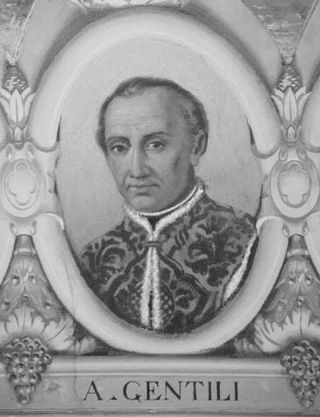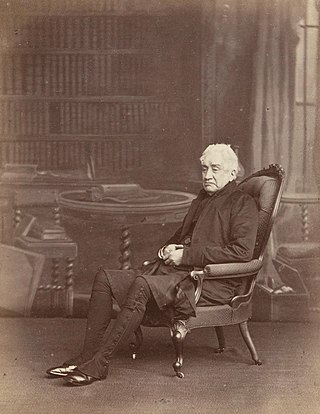
Downing College is a constituent college of the University of Cambridge and currently has around 950 students. Founded in 1800, it was the only college to be added to Cambridge University between 1596 and 1869, and is often described as the oldest of the new colleges and the newest of the old. Downing College was formed "for the encouragement of the study of Law and Medicine and of the cognate subjects of Moral and Natural Science", and has developed a reputation amongst Cambridge colleges for Law and Medicine.

All Souls College is a constituent college of the University of Oxford in England. Unique to All Souls, all of its members automatically become fellows. It has no student members, but each year, recent graduates at Oxford are eligible to apply for a small number of examination fellowships through a competitive examination and, for those shortlisted after the examinations, an interview.
The Knightbridge Professorship of Philosophy is the senior professorship in philosophy at the University of Cambridge. There have been 22 Knightbridge professors, the incumbent being Rae Langton.
The Downing Professorship of Medicine was one of the senior professorships in medicine at the University of Cambridge.

William Magee was an Irish academic and Church of Ireland clergyman. He taught at Trinity College Dublin, serving as Erasmus Smith's Professor of Mathematics (1800–1811), was Bishop of Raphoe (1819–1822) and then Archbishop of Dublin until his death.

The Professor of Law at Gresham College, London, gives free educational lectures to the general public. The college was founded for this purpose in 1597, when it created seven professorships; this was later increased to ten. Law is one of the original professorships as set out by the will of Thomas Gresham in 1575.
Edward Christian was an English judge and law professor. He was the older brother of Fletcher Christian, leader of the mutiny on the Bounty.

The Regius Chair of Civil Law, founded in the 1540s, is one of the oldest professorships at the University of Oxford.

John Lonsdale was an English clergyman, who was the third Principal of King's College, London, and later served as Bishop of Lichfield.

Samuel Hallifax or Halifax (1733–1790) was an English churchman and academic, holder of several chairs at Cambridge and was successively Bishop of Gloucester (1781–1789) and Bishop of St Asaph (1789–1790).

The position of Laudian Professor of Arabic, now known as the Abdulaziz Saud AlBabtain Laudian Professor, at the University of Oxford was established in 1636 by William Laud, who at the time was Chancellor of the University of Oxford and Archbishop of Canterbury. The first professor was Edward Pococke, who was working as a chaplain in Aleppo in what is now Syria when Laud asked him to return to Oxford to take up the position. Laud's regulations for the professorship required lectures on Arabic grammar and literature to be delivered weekly during university vacations and Lent. He also provided that the professor's lectures were to be attended by all medical students and Bachelors of Arts at the university, although this seems not to have happened since Pococke had few students, despite the provision for non-attenders to be fined. In 1881, a university statute repealed Laud's regulations and provided that the professor was to lecture in "the Arabic, Syriac, and Chaldee Languages", and attached the professorship to a fellowship at St John's College. In 2016, a large re-endowment from Kuwaiti philanthropist Abdulaziz Saud Al Babtain occasioned a change of the chair's name.

The position of Savilian Professor of Geometry was established at the University of Oxford in 1619. It was founded by Sir Henry Savile, a mathematician and classical scholar who was Warden of Merton College, Oxford, and Provost of Eton College, reacting to what has been described by one 20th-century mathematician as "the wretched state of mathematical studies in England" at that time. He appointed Henry Briggs as the first professor. Edward Titchmarsh said when applying that he was not prepared to lecture on geometry, and the requirement was removed from the duties of the post to enable his appointment, although the title of the chair was not changed. The two Savilian chairs have been linked with professorial fellowships at New College, Oxford, since the late 19th century. Before then, for over 175 years until the middle of the 19th century, the geometry professors had an official residence adjoining the college in New College Lane.

Thomas Elrington was an Irish academic and bishop who served as the 25th Provost of Trinity College Dublin from 1811 to 1820. He was Donegall Lecturer in Mathematics from 1790 to 1795 at Trinity College Dublin. While at Trinity College, he also served as Erasmus Smith's Professor of Mathematics from 1795 to 1799 and Erasmus Smith's Professor of Natural and Experimental Philosophy from 1799 to 1807.

The Regius Professorship of Hebrew in the University of Oxford is a professorship at the University of Oxford, founded by Henry VIII in 1546.

Edward Pearson (1756–1811) was an English academic and theologian, Master of Sidney Sussex College, Cambridge from 1808.
The Professorship of Comparative Law is a chair in law at the University of Oxford. The current holder of the chair is Lionel Smith.
The Professorship of Law (1973) is a permanently-established professorship in law at the University of Cambridge, founded in 1973. It is not linked to any particular field of law, and its most recent holder was the English legal comparativist, John Bell. Bell now holds the title Emeritus Professor of Law (1973).











